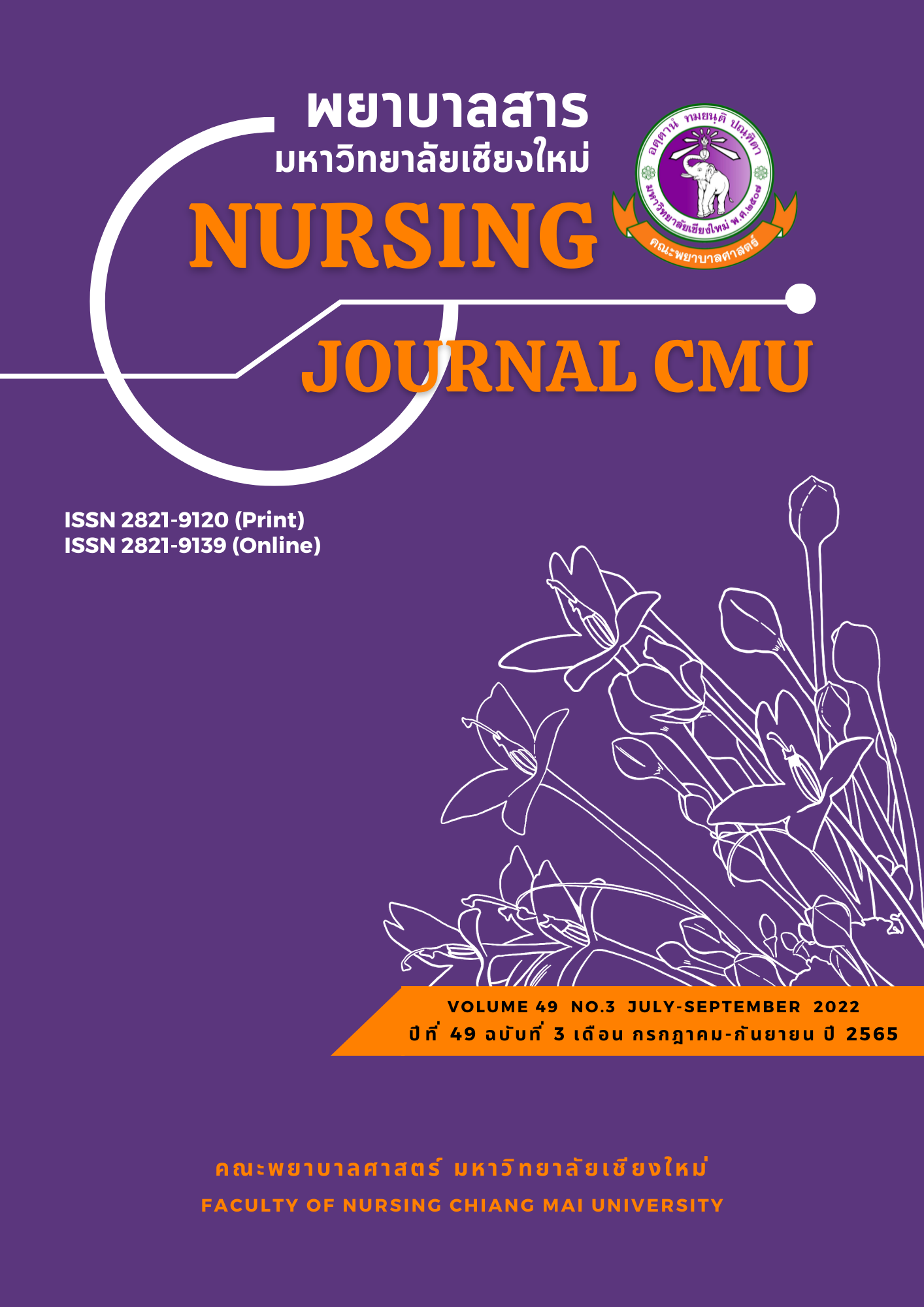Factors Related to Medication Adherence Among Older Persons with Heart Failure
Keywords:
Medication adherence, Health literacy, Social support, older persons with heart failureAbstract
Older persons with heart failure are a group of people with complex problems who are often affected by multiple medications, so medication adherence is needed to reduce potential problems and complications. This research is a descriptive study of the relationship of factors associated with medication adherence among older adults with heart failure. The sample was elderly people who attended cardiovascular clinics in tertiary hospitals, with a specific sample of 84 people. Four questionnaires were used for data collection: a personal information form, the Functional Communication and Critical Health Literacy Scale, social support questionnaires, and the Medication Adherence Scale in Thai. Descriptive statistics were used to determine the demographic data. The correlation between variables was tested with Spearman’s rank correlation coefficient.
The results showed that most older adults with heart failure recruited from tertiary hospitals had high health literacy, with an average of 41.31 (SD = 9.49), and received a high level of social support at 73.80% with an average of 52.65 (SD = 6.98). The majority of those had adequate medication adherence, at 96.40 % with an average of 37.86 (SD = 3.50). Moreover, emotional social support had a significantly positive relationship with medication adherence in older adults with heart failure (rs = .296 p < .01).
The results of this study can serve as a basis for nurses to plan the promotion of medication adherence in older adults with heart failure.
References
Allemann, H., Stromberg, A., & Thylen, I. (2018). Perceived social support in persons with heart failure living with an implantable cardioverter defibrillator: A cross-sectional explorative study. The Journal of Cardiovascular Nursing, 33(6), E1-E8.
Bunyatnopparat, K., & Limpawattana, P. (2019). Factor associated with medication adherence in older patients with chronic diseases of Dongluang Hospital. KKU Journal of Medicine, 5(2), 40-49. (in Thai)
Butrous, H., & Hummel, S. L. (2016). Heart failure in older adults. Canadian Journal of Cardiology, 32(9), 1140–1147.
Cajita, M. I., Cajita, T. R., & Han, H. (2016). Health literacy and heart failure: A systematic review. Journal of Cardiovascular Nursing, 31(2), 121-130. doi:10.1097/JCN.0000000000000229
Chesser, A. K., Woods, N. K., Smothers, K., & Rogers, N. (2015). Health literacy and older adults: A systematic review. Gerontology & Geriatric Medicine, 2, 1-13.
Gallagher, R., Luttik, M., & Jaarsma, T. (2011). Social support and self-care in heart failure. Journal of Cardiovascular Nursing, 26(6), 439-445.
Hermano, B. R., Barros, A. L., Lopes, J., Santos, M. A., Lopes, C. T., & Santos, V. B. (2021). Evaluation of social support and medication adherence in patients with coronary artery disease. Revista Brasileira de Enfermagem, 23(66979), 1-8.
House, J. S. (1981). Work stress and social support. Massachusetts: Addison-Wesley.
Ishikawa, H., Takeuchi, T., & Yano, E. (2008). Measuring functional, communicative, and critical health literacy among diabetic patients. Diabetes Care, 31(5), 874-879.
Jongwilaikasem, K., & Lerkiatbundit, S. (2021). Development of the Medication Adherence Scale for Thais (MAST). Thai Journal of Pharmacy Practice, 13(1), 17-30. (in Thai)
Kripalani, S., Risser, J., Gatti, M. E., & Jacobson, T. A. (2009). Development and evaluation of the Adherence to Refills and Medications Scale (ARMS) among low-literacy patients with chronic disease. Value in Health, 12(1), 118-123. doi: 10.1111/j.1524-4733.2008.00400
Lee, H., Park, J. H., Floyd, J. S., Park, S., & Kim, H. C. (2019). Combined effect of income and medication adherence on mortality in newly treated hypertension: Nationwide study of 16 million person-years. Journal of the American Heart Association, 8, e013148. doi: 10.1161/JAHA.119.013148
Lippi, G., & Sanchis-Gomar, F. (2020). Global epidemiology and future trends of heart failure. AME Medical Journal, 3(1), 7-11.
Lueder, T. G., & Agewall, S. (2018). The burden of heart failure in the general population: A clearer and more concerning picture. Journal of Thoracic Disease, 10(Suppl 17), S1934-S1937.
Mastromarino, V., Casenghi, M., Testa, M., Gabriele, E., Coluccia, R., Rubattu, S. & Volpe, M. (2014). Polypharmacy in heart failure patients. Current Heart Failure Reports, 11(2), 212-219. doi: 10.1007/s11897-014-0186-8
Noppakraw, J., Chintanawat, R., & Khampolsir, T. (2020). Health literacy and self-management in older persons with type 2 diabetes mellitus. Nursing Journal, 47(2), 251-261. (in Thai)
Nutbeam, D. (2008). The evolving concept of health literacy. Social Science & Medicine, 67(12), 2072-2078.
Pallangyo, P., Millinga, J., Bhalia, S., Mkojera, Z., Misidai, N., Swai, H. J., …. Janabi, M. (2020).Medication adherence and survival among hospitalized heart failure patients in a tertiary hospital in Tanzania: A prospective cohort study. BMC Research Notes, 13, 89.
Riles, E. M., Jain, A. V., & Fendrick, A. M. (2014). Medication adherence and heart failure. Current Cardiology Reports, 16(3), 458. doi: 10.1007/s11886-013-0458-z
Rungsawang, S. (2015). Factors related to polypharmacy medication adherence among older persons with chronic illness. Journal of Nursing, Siam University, 18, 6-23. (in Thai)
Sabaté, E., & Sabaté, E. (2003). Adherence to long-term therapies: Evidence for action. Retrieved from https://www.who.int/chp/knowledge/publications/adherence_ report/en/
Savarese, G., & Lund, L. H. (2017). Global public health burden of heart failure. Cardiac Failure Review, 3(1), 7-11.
Sthapornnanon, N. (2012). Medication nonadherence. Thai Bulletin of Pharmaceutical Sciences, 7(1), 23-39. (in Thai)
Wannasirikul, P., Termsirikulchai, L., Sujirarat, D., Benjakul, S., & Tanasugarn, C. (2016). Health literacy, medication adherence, and blood pressure level among hypertensive older adults treated at primary health care centers. The Southeast Asian Journal of Tropical Medicine and Public health, 47(1), 109-120.
Wetmanut, H. (2004). Factors predicting health promoting behaviors among the elderly with heart failure (Unpublished master's thesis). Chiang Mai University, Thailand.
Wongyai, S., Maneesriwongul, W., & Putawatana, P. (2014). Factors related to medication adherence among patients with diabetes mellitus type 2 at diabetic clinics. Journal of Boromarajonani College of Nursing, Bangkok, 30(2) 80-90. (in Thai)
Downloads
Published
How to Cite
Issue
Section
License
Copyright (c) 2022 Nursing Journal

This work is licensed under a Creative Commons Attribution-NonCommercial-NoDerivatives 4.0 International License.
บทความที่ได้รับการตีพิมพ์เป็นลิขสิทธิ์ของวารสารพยาบาลสาร
ข้อความที่ปรากฏในบทความแต่ละเรื่องในวารสารวิชาการเล่มนี้เป็นความคิดเห็นส่วนตัวของผู้เขียนแต่ละท่านไม่เกี่ยวข้องกับมหาวิทยาลัยเชียงใหม่ และคณาจารย์ท่านอื่นๆในมหาวิทยาลัยฯ แต่อย่างใด ความรับผิดชอบองค์ประกอบทั้งหมดของบทความแต่ละเรื่องเป็นของผู้เขียนแต่ละท่าน หากมีความผิดพลาดใด ๆ ผู้เขียนแต่ละท่านจะรับผิดชอบบทความของตนเองแต่ผู้เดียว






